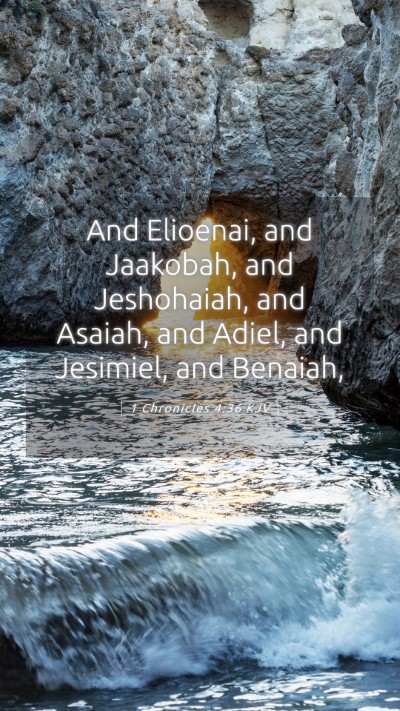Understanding 1 Chronicles 4:36
1 Chronicles 4:36 states:
"And Eliezer his son had dominion over all the treasures of the dedicated things, which David the king and the chief fathers had dedicated, and the chief of the fathers, and the captains of thousands and hundreds, and the captains of the host, had dedicated."
This verse provides insights into the responsibilities and connections within the Levitical priesthood and the management of treasures dedicated to God.
Bible Verse Meanings
This verse encapsulates themes of leadership, stewardship, and devotion. By examining 1 Chronicles 4:36, we can glean several important meanings:
- Leadership and Responsibility: Eliezer, as the son of a leading figure, was entrusted with significant responsibilities. This emphasizes the notion of passing down duties and the importance of godly leadership.
- Dedication of Treasures: The mention of dedicated treasures highlights the significance of offering and consecrating possessions for divine service, indicating a communal responsibility towards sacred items.
- Collaboration in Worship: The involvement of chief fathers and captains indicates a collective effort in honoring God, suggesting that worship and service are best performed in community.
Bible Verse Interpretations
From a scholarly perspective, this verse can be interpreted as part of the broader narrative regarding the administrative roles within the nation of Israel post-exodus. Eliezer's role symbolizes:
- The importance of family lineage in spiritual leadership.
- The continuity of faith practices through generations.
- The establishment of a system for managing resources dedicated to God.
Bible Verse Explanations
Explaining this verse in detail necessitates an understanding of historical context:
- Historical Context: 1 Chronicles was written after the Babylonian Exile, aiming to restore hope and identity among returned exiles. Eliezer stands as a figure of hope, indicating the continuity of worship traditions.
- Cultural Significance: In Israelite culture, dedicating items to God was a common practice that reflected a tangible acknowledgment of God's providence.
Commentary from Notable Scholars
Insights from various public domain commentaries expand our understanding of 1 Chronicles 4:36:
- Matthew Henry: He emphasizes the divine order established through leadership roles. Eliezer's stewardship over treasures symbolizes the seriousness of service to God.
- Albert Barnes: He notes that collective dedication was crucial in Old Testament worship, illustrating how every member of the community held a part in service to God.
- Adam Clarke: Clarke elaborates on the significance of the treasures involved—not merely material but spiritual connections that unite the community in reverence to God.
Applying Bible Verses to Daily Life
The significance of this passage goes beyond historical analysis. Here are practical applications:
- Stewardship: Like Eliezer, we are called to manage resources wisely in our communities.
- Community Worship: Engaging in worship and dedication as part of a community or church encourages spiritual unity.
- Legacy of Faith: Recognizing the importance of our spiritual influence on future generations reinforces our calling to be examples of godliness.
Cross References
This verse has connections with several other scriptures, offering deeper insight:
- 1 Chronicles 26:20-27: Discusses the duties of the Levites concerning the treasures.
- 2 Samuel 8:11: Chronicles how David brought items from conquered nations for God’s treasury.
- Exodus 36:6: Expresses the people’s willingness to give for the construction of the Tabernacle, mirroring the idea of dedicating treasures.
Conclusion
1 Chronicles 4:36 encourages a comprehensive understanding of biblical stewardship and community worship. By exploring its meaning, interpretation, and applications, believers can enrich their Bible study insights and enhance their spiritual journeys together.


